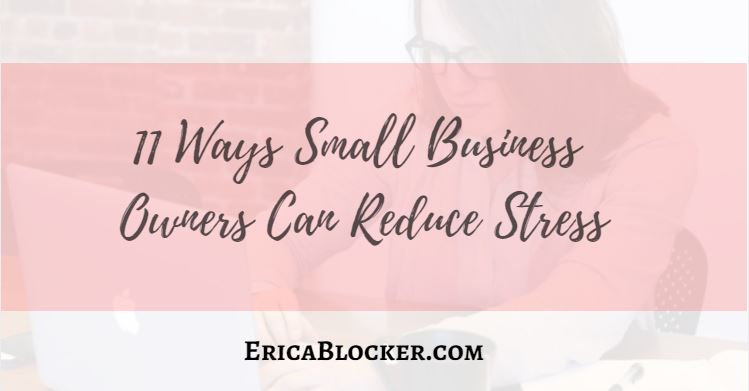
Everyone gets a little bit stressed at times, but small business owners tend to face a lot more stress than other people. In fact, running your own business can completely overwhelming at the best of times, mostly because everything that goes right or wrong falls on you, and then you have to deal with the aftermath too. While it is common for small business owners to feel stressed a large portion of the time, don’t be fooled into thinking that it is okay. Excessive stress can have some serious health implications, including anxiety, depression, stroke, heart disease, and diabetes, so it is always a sensible idea to manage and reduce your stress if possible. You may feel like the stress will be worth it in the end, but, at the end of the day, you’re not going to enjoy any sort of success if your stress has made you ill or worse. Your health always has to come first, so, with that in mind, here are eleven things that you can do to help manage and reduce your stress.
- Use It
As I’ve already said, too much stress can prove to be a massive issue, but some of that stress is important and incredibly useful. If you were never stressed, you wouldn’t ever feel any motivation to do anything, especially boring, yet important, work tasks. If you know that you are going to find a day particularly stressful, try to change the way you look at it. Rather than dread the day, get excited and think of it as a challenge that you have to overcome. Use the stress to motivate you to be organised, plan out tasks, and then get them done. You can even reward yourself after the day is done so that you begin to associate stress with accomplishment rather than fear.
- Listen To Your Gut
Your body has three basic needs, food, water, and sleep (we’ll get onto this later), and if you aren’t fulfilling any one of these needs then your stress levels are going to rise, and you will find it harder to handle difficult situations. Because of this, it’s incredibly important to make sure that you are drinking and eating enough throughout the day. Carry around a bottle of water with you wherever you go, and make sure that you take a sip when you feel thirsty. Also, make sure that you keep some snacks in your desk drawer for if you’re feeling a little peckish. Just ensure that these are healthy snacks, like fruit and nuts, as junk food is only ever going to make you feel worse.
- Have A Break
If you feel the stress bubbling, take this as a sign that you need a break and take yourself elsewhere, especially if you’ve been working for hours without one. It’s not easy to stop working when you know how much you need to get done, but you will be a whole lot more productive after a walk around the block or a quick chat with someone in your office. Getting away from your computer for a while will also help you to feel more energized, and will reduce the chances of you from causing any damage to your eyes.

- Sleep Well
As I’ve already said, your body needs sleep to function properly, so if you aren’t getting enough, or aren’t having a quality sleep each night, then you are going to wake up tired and are going to get stressed. Without enough sleep, you are going to go into work feeling sluggish, agitated, and emotional, and this is going to affect how much work you are able to get done. It doesn’t matter how much work you have to get done; Sleep should always be a top priority. Of course, stress can make it difficult for you to fall asleep, which can be a problem, so you need to find ways to relax. Having a nice bath, staying off your phone, and writing in a journal have been shown to be incredibly useful methods. You should also make sure that your bedroom is cool, dark, and quiet, or you will likely wake up in the night.
- Get Moving
Exercise is a great way to get your mind off the stresses of the office, which is why it is so commonly recommended to those suffering from stress. It also triggers the release of neurotransmitters, called endorphins, which help to combat symptoms of stress. Moreover, any type of physical activity with have these calming effects, so don’t get worried thinking that your only cure is running a marathon or spending hours in the gym each evening. Anything that gets your blood pumping a little will be a huge benefit, including a walk around the block during a break.
- Learn To Say No
As a business owner, you are going to have to do wear a lot of hats and juggle a lot of plates at once, and, clearly, this is going to take its toll and increase your stress levels. If someone asks you to do something, and you know that you aren’t going to get it done without missing out on sleep or food or something else important, you are allowed to politely refuse. You don’t have to do anything you don’t want to. Similarly, if you are having problems with a particular employee or client, and they are causing you excessive amounts of stress, no one would blame you for cutting ties and calling it quits with them.
- Delegate Tasks
As a business owner, there is a lot that you are going to have to deal with personally, but there is also a lot that you shouldn’t have to waste your time on. If you need to hire a commercial skip bin, ask your assistant to do it, rather than scouring the internet for companies yourself. There are lots of other things much more complicated than this that you also don’t need to be handling. Bookkeeping, scheduling meetings, handling taxes, and running social media accounts are all things that you could delegate to employees. Don’t give yourself work unless you are the only person that can complete this work, as you have enough on your plate already.
- Make Things Automatic
To make things even easier, sometimes you don’t even need to hire someone to get tasks done for you. You see, technology is absolutely amazing, and nowadays there are so many things that you can set up online that will just do things on their own. For example, rather than worrying about remembering to order office supplies every week or month, you can set up a recurring order, so that it does it automatically.
- Don’t Be A Perfectionist
Business owners are incredibly strong-willed and independent people, so it makes sense for you to want everything to be absolutely perfect all the time, but this is only ever going to cause you unnecessary stress. You are just going to have to accept that sometimes things go wrong and perfection is very rarely achievable. Of course, you should plan for things as best as you can and try to complete tasks to the best of your ability, but don’t waste precious time trying to plan for absolutely everything.

- Have Some Fun
A great way to reduce stress is to remember that is also okay to get away from work and have some fun, as maintaining a work-life balance is incredibly important. When you own a business, you probably aren’t going to have as much time to spend with your family, so you should make time every now and then to have some guilt-free fun with them. Leaning on your family and friends and sharing your stresses with them will also help, as it will give you a better perspective of your problems. You never know, they might even have some advice that can help you out.
- Take A Step Back
As the boss, you have several benefits, and one of them is that you can have time off whenever you like. Of course, you probably shouldn’t be taking months off work, as your business will likely suffer, but a couple of weeks isn’t going to do any harm but will do you a world of good. You aren’t going to do your business any favors if you are constantly exhausted and riddled with stress, so you need to recognize when you need to take a step back and relax for a little while. Go on vacation, have some fun, spend time with the ones you love, relax, and charge your batteries. Then, once it’s over, you’ll be able to go back to work feeling refreshed and ready to take on the world.
It’s completely understandable that business owners are stressed, but stress isn’t healthy, so you need to do something to manage it. If none of the methods here work and you feel as though you need some more help, then visit your doctor or a psychologist for some professional advice.








